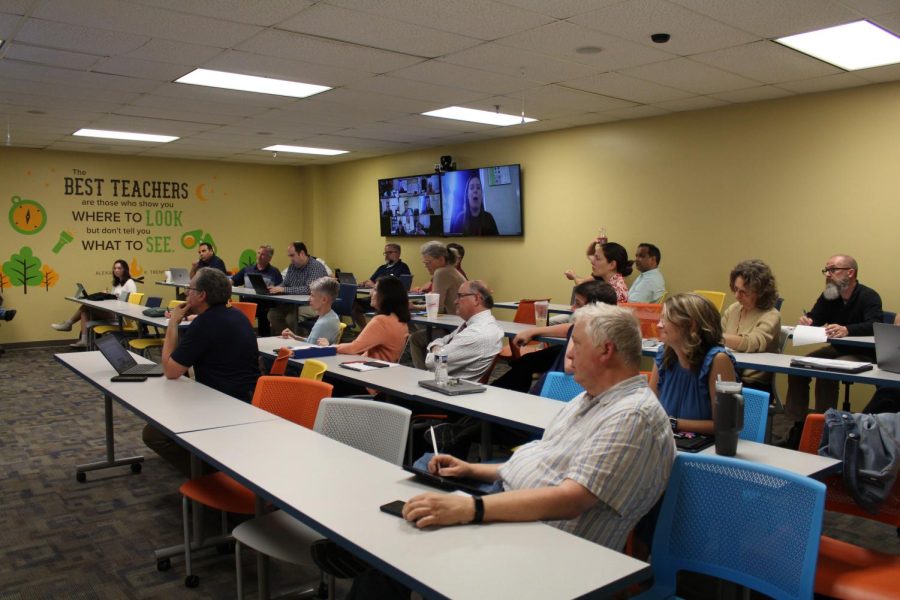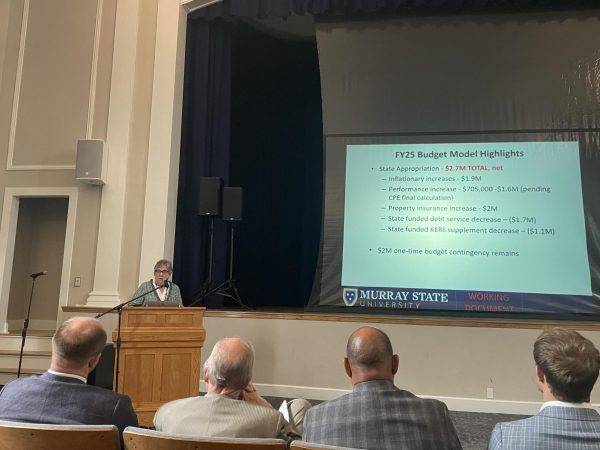Faculty Senate proposes new promotion track
The Faculty Senate discusses, a revised promotion track and the cost-of-living adjustment (COLA) on April 4. (Dionte Berry/The News)
April 6, 2023
Faculty senators discussed plans to revise their handbook policy regarding tenure status and qualifications for promotion at their Tuesday, April 4 meeting.
Senate President David Roach proposed an addition to the faculty handbook, which would allow certain faculty members who are not currently on the tenure track to qualify for promotion.
“There are a large group of faculty—over 130—that are not on the promotion track,” Roach said. “We need to think about how to approach this problem, how to give them compensation for all their hard work.”
Currently three ranked faculty titles exist: assistant professor, associate professor and professor, according to the handbook, which was last updated in June 2019.
Roach said some faculty members, mainly those who work in a clinical department, do not qualify for tenure, and some faculty who work as assistant professors but are not on the promotion or tenure track.
Barbie Papajeski, senior instructor of Veterinary Technology and Pre-Veterinary Medicine, said she feels there are excellent faculty at the University for whom no one is advocating.
“We don’t fit in the handbook,” Papajeski said. “That’s the problem. I served on this committee. There’s no guidelines for any promotion unless you are a tenure track faculty.”
Faculty consists of three groups: ranked regular faculty, ranked administrative faculty and special appointment faculty, according to the handbook.
Roach’s solution is to add a fourth rank: ranked clinical faculty.
“This is just an idea, as a recommendation, to take some baby steps towards getting promotion to some of our faculty groups that don’t have access to it,” Roach said.
Papajeski said it’s not about money but rather recognition.
During the meeting, officer positions were also discussed. Roach was reelected as senate president. Heidi Ortega was reelected as senate vice president. Sarah Martin recently stepped down as senate secretary, and Michael Bordieri was elected to replace her.
Jen Super, chair of the Finance Committee, discussed the cost-of-living adjustment (COLA) and consumer price index.
COLA is generally expressed as a fixed percentage of a salary. Super said over the last five years, it has ranged from 0% to 3% and is not keeping up with inflation.
In the 2022 fiscal year, faculty received a tiered COLA. On average, it ended up being 2.15%, Super said.
“If you are in the higher brackets in terms of your income, that was a dramatic loss,” Super said.
For the 2023 fiscal year, faculty received a 3% COLA.
Super said a COLA gap in purchasing power for the upcoming year was calculated on average as 6.1%, which is down from 9.8% in 2013.
The Finance Committee is continuing to monitor the situation and measure the impact.
Faculty Senate’s next meeting will be May 2.













































































































